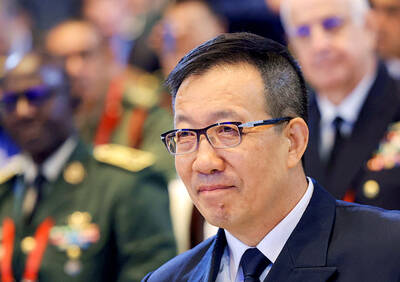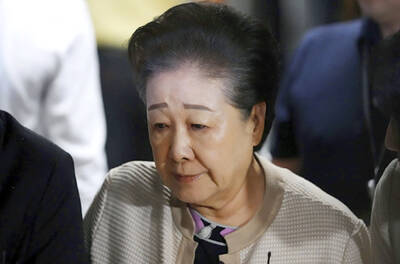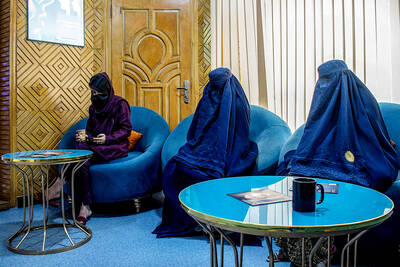Global leaders ended a UN development summit in Rio de Janeiro on Friday with what was widely considered a lackluster agreement.
Nearly 100 world leaders gathered over the past three days in efforts to establish “sustainable development goals,” a UN drive built around economic growth, the environment and social inclusion. However, a lack of consensus over those goals led to an agreement that even some signatory nations said lacked commitment, specifics and measurable targets.
As a result, many ecologists, activists, and business leaders now believe that progress on environmental issues must be made locally with the private sector, and without the help of international accords.

Photo: AFP
US Secretary of State Hillary Rodham Clinton admitted as much: “Governments alone cannot solve all the problems we face, from climate change to persistent poverty to chronic energy shortages.”
Most troubling for many critics of the summit is the fact that leaders arrived in Rio merely to sign a text that their diplomats had all but sealed beforehand. The text, dubbed “The Future We Want,” left little room for vision or audacity, critics argued.
“The world we want will not be delivered by leaders who lack courage to come here, sit at the table and negotiate themselves,” said Sharon Burrow, general-secretary of the International Trade Union Confederation.
Some heads of state and government stayed away, given the global economic slowdown, worsening debt woes in Europe and continued violence in the Middle East. Notable absentees included US President Barack Obama, German Chancellor Angela Merkel and British Prime Minister David Cameron, all of whom did attend a G20 summit earlier this week in Mexico.
Some delegates left on Thursday and by late on Friday a handful of leaders were still delivering ceremonial addresses in a large, empty hall. Organizers say the purpose of the summit was to initiate a process to define a new set of development principles, not the forging of legally binding treaties.
“The storyline is different from 1992,” said Andre Correa do Lago, chief negotiator at the conference for Brazil, which led the final talks on the declaration. “This summit recognizes more than the others that not one size fits all.”
Many leaders used their time at the podium to note the markedly different needs they were struggling with, especially compared with the developed world. While Brazil, China and other big emerging nations spoke of their need to catch up with rich countries, others like Bolivia, Iran and Cuba unleashed traditional rants against capitalism and conventional definitions of growth.
One point of contention is what many emerging nations say is a need for a global fund that could help them pursue development goals.
Early talk of a US$30 billion fund for that purpose as a possible outcome of the summit foundered well before leaders arrived. A French proposal to tax financial transactions for that purpose also failed.
On a positive note, Clinton announced a US$20 million grant for clean energy projects in Africa and UN Secretary-General Ban Ki-moon said on Thursday that private investors since last year had pledged over US$50 billion to boost the use of renewable energy sources worldwide.
Many business leaders at the conference said they were eager to find ways to contribute further. Richard Branson, the British billionaire, said: “There’s very little in a document like what they’ve come up with to accomplish real goals. That leaves it to the rest of us to find ways to move forward.”
However, some warned that private initiatives, while helpful, could not be responsible for the rulemaking and law enforcement necessary to ensure that wholesale changes take place.
“The private sector has an enormous and important role to play but not as a substitute to governments and international leadership,” said Malcolm Preston, who leads the sustainability and climate change practice at PriceWaterhouseCoopers.
Environmentalists remained angry that leaders failed to make commitments on two key issues: measures to protect the high seas and defining a process to stop subsidizing fossil fuels.
Brazilian President Dilma Rousseff and other leaders said the outcome of the summit reflected what was possible after more than a year of discussions among the 193 government delegations that attended the summit.
“From here we can only advance,” she said.

COMFORT WOMEN CLASH: Japan has strongly rejected South Korean court rulings ordering the government to provide reparations to Korean victims of sexual slavery The Japanese government yesterday defended its stance on wartime sexual slavery and described South Korean court rulings ordering Japanese compensation as violations of international law, after UN investigators criticized Tokyo for failing to ensure truth-finding and reparations for the victims. In its own response to UN human rights rapporteurs, South Korea called on Japan to “squarely face up to our painful history” and cited how Tokyo’s refusal to comply with court orders have denied the victims payment. The statements underscored how the two Asian US allies still hold key differences on the issue, even as they pause their on-and-off disputes over historical

BEIJING FORUM: ‘So-called freedom of navigation advocated by certain countries outside the region challenges the norms of international relations,’ the minister said Chinese Minister of National Defense Dong Jun (董軍) yesterday denounced “hegemonic logic and acts of bullying” during remarks at a Beijing forum that were full of thinly veiled references to the US. Organizers said that about 1,800 representatives from 100 countries, including political, military and academic leaders, were in Beijing for the Xiangshan Forum. The three-day event comes as China presents itself as a mediator of fraught global issues including the wars in Ukraine and Gaza. Addressing attendees at the opening ceremony, Dong warned of “new threats and challenges” now facing world peace. “While the themes of the times — peace and development —

BRIBERY ALLEGATIONS: A prosecutor said they considered the risk of Hak-ja Han tampering with evidence to be very high, which led them to seek the warrant South Korean prosecutors yesterday requested an arrest warrant for the leader of the Unification Church, Hak-ja Han, on allegations of bribery linked to the country’s former first lady and incitement to destroy evidence. The move came a day after the 82-year-old was questioned over her alleged role in bribing former first lady Kim Keon-hee and a lawmaker. Founded in 1954 by her late husband, Sun Myung Moon, the Unification Church has long been the subject of controversy and criticism, with its teachings centered on Moon’s role as the “second coming” and its mass weddings. Followers are derisively referred to as “Moonies.” However, the church’s

Decked out with fake crystal chandeliers and velvet sofas, cosmetic surgery clinics in Afghanistan’s capital are a world away from the austerity of Taliban rule, where Botox, lip filler and hair transplants reign. Despite the Taliban authorities’ strict theocratic rule, and prevailing conservatism and poverty in Afghanistan, the 20 or so clinics in Kabul have flourished since the end of decades of war in the country. Foreign doctors, especially from Turkey, travel to Kabul to train Afghans, who equally undertake internships in Istanbul, while equipment is imported from Asia or Europe. In the waiting rooms, the clientele is often well-off and includes men